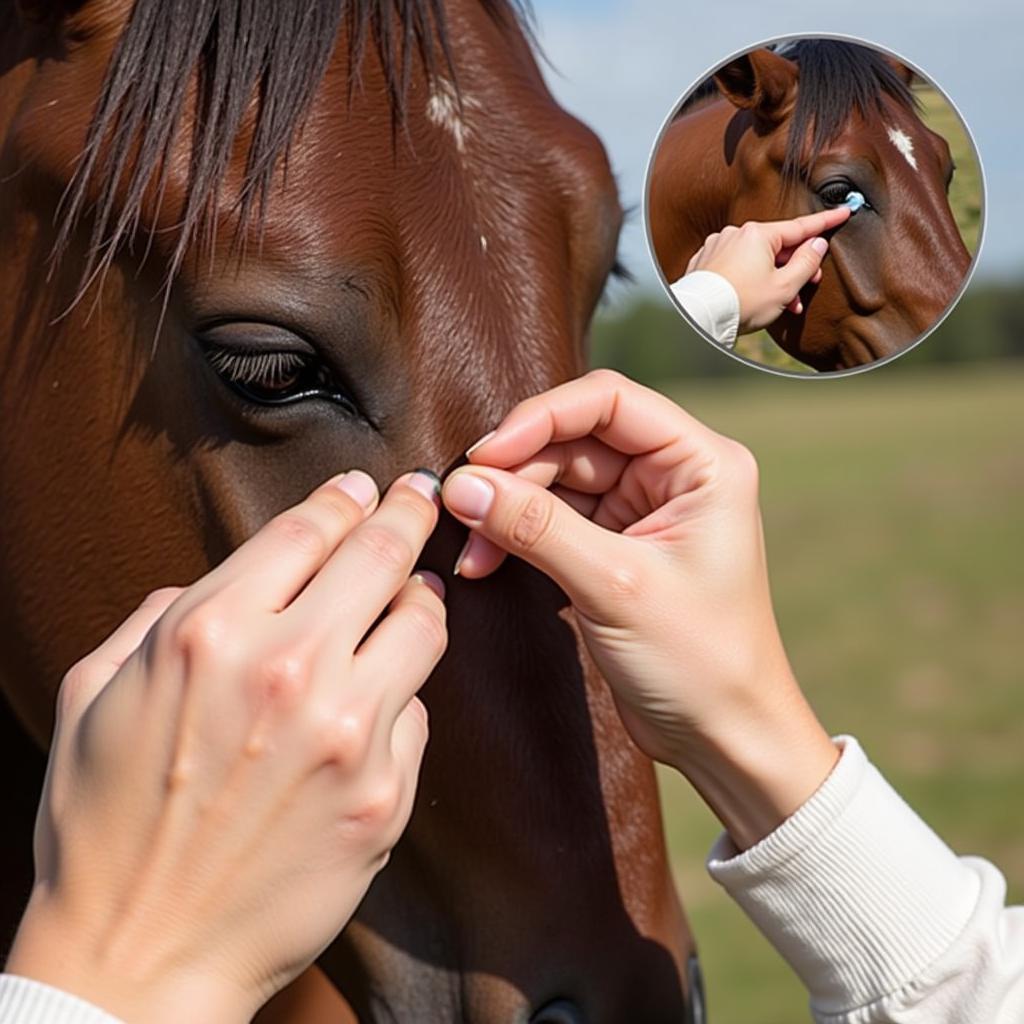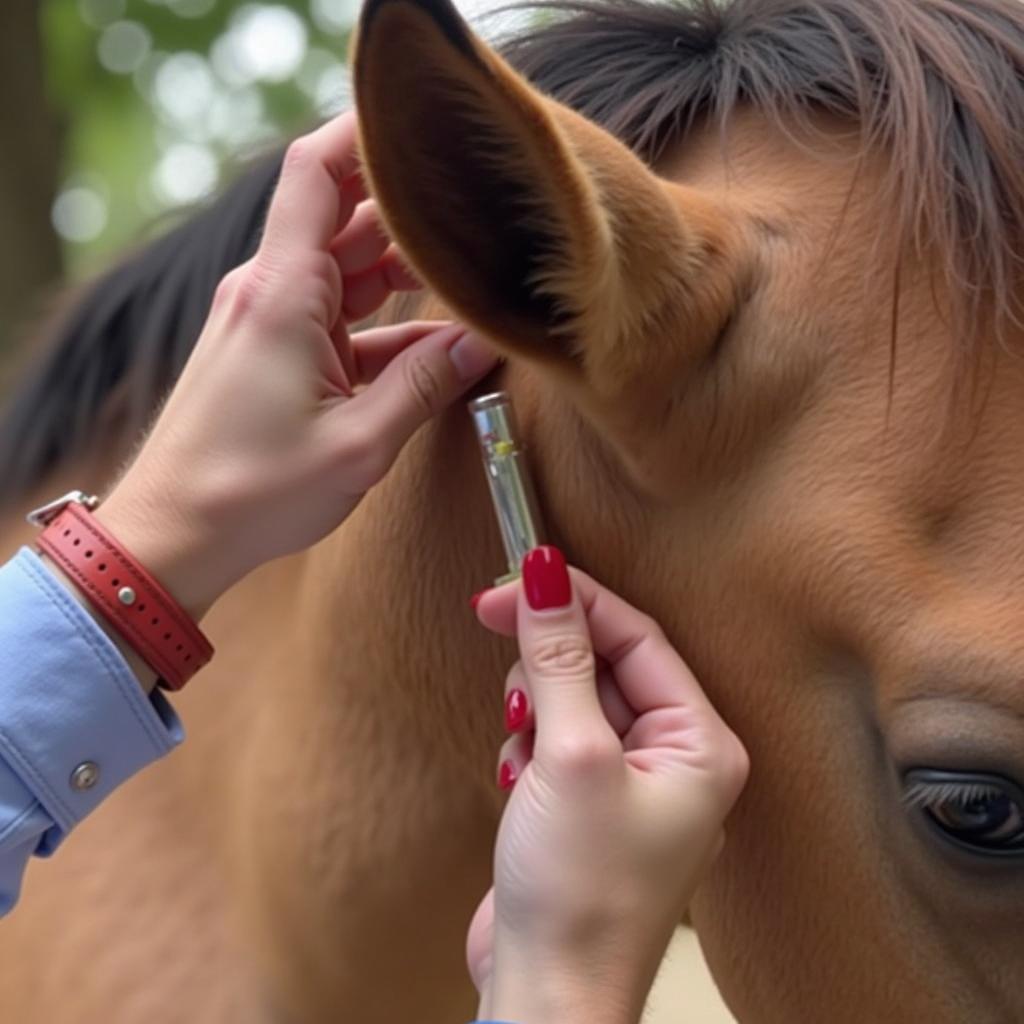A Head Check For Horses, much like a regular check-up for us, is an essential part of responsible horse ownership. It involves a visual and hands-on inspection of your horse’s head, looking for any signs of injury, illness, or abnormalities. Early detection of problems in this area is crucial as it can prevent more serious issues down the line and ensure your equine companion stays happy and healthy.
Why is a Head Check So Important?
Horses are masters at masking pain, often hiding symptoms until a problem becomes severe. The head, in particular, is a sensitive area prone to various issues, from minor cuts and scrapes to more serious conditions affecting the eyes, ears, teeth, and even the brain. By conducting a regular head check, you can catch these problems early on, allowing for timely intervention and treatment.
What to Look for During a Head Check
A thorough head check involves both visual observation and physical examination. Here’s a step-by-step guide:
- Observe from a Distance: Start by observing your horse from a distance, checking for any obvious signs of swelling, asymmetry, or unusual head tilt. Pay attention to their posture, movement, and overall demeanor.
- Examine the Eyes: Check for any discharge, cloudiness, redness, or swelling around the eyes. Gently pull down the lower eyelid to check for any signs of inflammation or foreign objects.
- Inspect the Ears: Feel along the ears for any heat, swelling, or pain response. Look inside the ears for any discharge, debris, or parasites.
- Check the Nostrils: Ensure both nostrils are clear and free of any discharge. Observe the horse’s breathing pattern, listening for any whistling, wheezing, or labored breathing.
- Examine the Mouth: Look for any signs of injury, swelling, or discharge around the lips and gums. Check for any missing, broken, or misaligned teeth.
- Feel the Jaw: Gently feel along the jawbone for any signs of swelling, pain, or asymmetry.
 Checking a Horse's Eyes
Checking a Horse's Eyes
Common Issues Detected During a Head Check
Several common issues can be identified during a head check:
- Eye Infections: Redness, swelling, discharge, and squinting are all signs of a potential eye infection, requiring veterinary attention.
- Ear Infections: Head shaking, ear scratching, and discharge from the ears could indicate an ear infection.
- Dental Problems: Difficulty eating, dropping food, weight loss, and bad breath can all be signs of dental problems, such as sharp enamel points or tooth decay.
- Head Injuries: Swelling, cuts, and abrasions may indicate a head injury, especially if accompanied by neurological symptoms.
When to Call the Vet
If you notice any abnormalities during your head check, it’s crucial to contact your veterinarian immediately. Early diagnosis and treatment can significantly improve the outcome for your horse. Remember, when it comes to your horse’s health, it’s always better to err on the side of caution.
Head Checks: A Small Step for a Big Impact
A head check might seem like a small step, but it can have a big impact on your horse’s well-being. By making it a regular part of your horse care routine, you can help ensure they lead a long, healthy, and happy life.
FAQs
Q: How often should I perform a head check on my horse?
A: It’s recommended to perform a head check at least once a week. However, daily checks are ideal, especially if your horse is stabled for long periods or participates in strenuous activities.
Q: What should I do if my horse resists the head check?
A: Patience and positive reinforcement are key. Start slowly, gradually introducing each step of the head check. If your horse remains resistant, consult a veterinarian or equine behaviorist for guidance.
 Examining a Horse's Ears for Signs of Infection
Examining a Horse's Ears for Signs of Infection
Still have questions?
We’re here to help! If you have any concerns about your horse’s health or need further advice on performing a head check, don’t hesitate to contact us. Our team of experts at Justus Horses USA is dedicated to providing you with the information and support you need to keep your equine partner happy and healthy.
You can also find more information on other aspects of horse care on our website. Check out our articles on signs of hock pain in horses and horses spooked for valuable insights. For those looking for riding gear, we have informative articles on cheap horse riding helmets and insights into J and J Paints and Quarter horses. Lastly, if you’re in the market for a new trailer, don’t miss our guide on 3 horse trailer for sale.
Remember, a healthy horse starts with you.
Contact us:
Phone: 0772127271
Email: [email protected]
Address: QGM2+WX2, Vị Trung, Vị Thuỷ, Hậu Giang, Việt Nam.
We have a 24/7 customer service team ready to assist you.